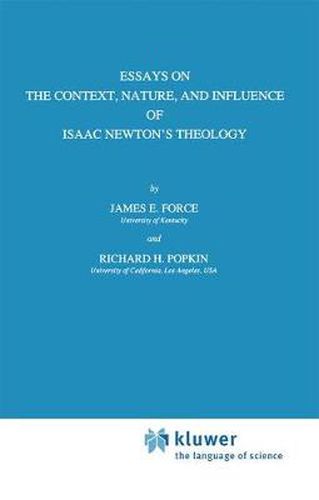Readings Newsletter
Become a Readings Member to make your shopping experience even easier.
Sign in or sign up for free!
You’re not far away from qualifying for FREE standard shipping within Australia
You’ve qualified for FREE standard shipping within Australia
The cart is loading…






This title is printed to order. This book may have been self-published. If so, we cannot guarantee the quality of the content. In the main most books will have gone through the editing process however some may not. We therefore suggest that you be aware of this before ordering this book. If in doubt check either the author or publisher’s details as we are unable to accept any returns unless they are faulty. Please contact us if you have any questions.
This collection of essays is the fruit of about fifteen years of discussion and research by James Force and me. As I look back on it, our interest and concern with Newton’s theological ideas began in 1975 at Washington University in St. Louis. James Force was a graduate student in philosophy and I was a professor there. For a few years before, I had been doing research and writing on Millenarianism and Messianism in the 17th and 18th centuries, touching occasionally on Newton. I had bought a copy of Newton’s Observations upon the Prophecies of Daniel, and the Apocalypse of St. John for a few pounds and, occasionally, read in it. In the Spring of 1975 I was giving a graduate seminar on Millenarian and Messianic ideas in the development of modem philosophy. Force was in the seminar. One day he came very excitedly up to me and said he wanted to write his dissertation on William Whiston. At that point in history, the only thing that came to my mind about Whiston was that he had published a, or the, standard translation of Josephus (which I also happened to have in my library. ) Force told me about the amazing views he had found in Whiston’s notes on Josephus and in some of the few writings he could find in St. Louis by, or about, Whiston, who was Newton’s successor as Lucasian Professor of mathematics at Cambridge and who wrote inordinately on Millenarian theology.
$9.00 standard shipping within Australia
FREE standard shipping within Australia for orders over $100.00
Express & International shipping calculated at checkout
This title is printed to order. This book may have been self-published. If so, we cannot guarantee the quality of the content. In the main most books will have gone through the editing process however some may not. We therefore suggest that you be aware of this before ordering this book. If in doubt check either the author or publisher’s details as we are unable to accept any returns unless they are faulty. Please contact us if you have any questions.
This collection of essays is the fruit of about fifteen years of discussion and research by James Force and me. As I look back on it, our interest and concern with Newton’s theological ideas began in 1975 at Washington University in St. Louis. James Force was a graduate student in philosophy and I was a professor there. For a few years before, I had been doing research and writing on Millenarianism and Messianism in the 17th and 18th centuries, touching occasionally on Newton. I had bought a copy of Newton’s Observations upon the Prophecies of Daniel, and the Apocalypse of St. John for a few pounds and, occasionally, read in it. In the Spring of 1975 I was giving a graduate seminar on Millenarian and Messianic ideas in the development of modem philosophy. Force was in the seminar. One day he came very excitedly up to me and said he wanted to write his dissertation on William Whiston. At that point in history, the only thing that came to my mind about Whiston was that he had published a, or the, standard translation of Josephus (which I also happened to have in my library. ) Force told me about the amazing views he had found in Whiston’s notes on Josephus and in some of the few writings he could find in St. Louis by, or about, Whiston, who was Newton’s successor as Lucasian Professor of mathematics at Cambridge and who wrote inordinately on Millenarian theology.